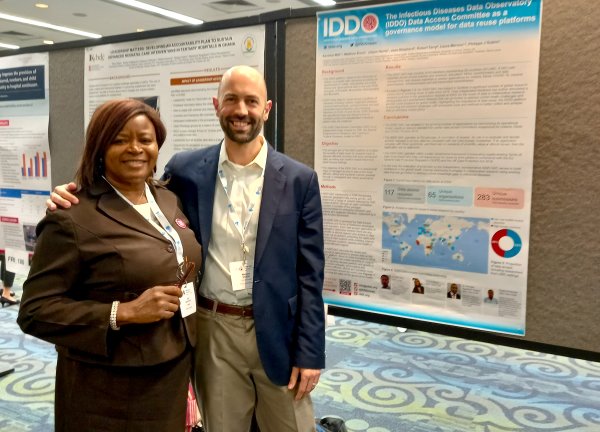Case report form for VL HIV coinfection - user guide
IDDO at CUGH: connecting with the global health community
Matt Brack, IDDO’s Senior Programme Manager, recently presented on our equitable approach to data collaborations in global health research at the Consortium of Universities for Global Health Conference (CUGH) in Washington, DC.

It was a busy few days as around 1,500 participants represented 65 countries at the event, which was highly multi-disciplinary, addressing topics ranging from implementation research and policy influence to funding strategy and operational capacity in resource-limited settings, all aligned with CUGH’s aim to support the university as a transforming force in global health.
Matt was joined by IDDO Data Access Committee (DAC) member, Dr Joan H. Shepherd, from the Sierra Leone Ethics and Scientific Review Committee (Ministry of Health and Sanitation) and Principal of the National School of Midwifery who was at the conference to present her work in a session on equity and innovation in health professional education: Covid-19 Pandemic and Post-Pandemic. Dr Shepherd also co-presented a poster on the IDDO DAC as a governance model for data reuse platforms.
“Participating at the recent CUGH Conference offered a unique opportunity to engage in face-to-face interaction with other professionals in the global health drive,” said Dr Shepherd. “Discussions around the presentations by speakers were lively and engaging, paving the way for future areas of collaboration and interest.
“IDDO’s contributions to the conference strategically highlighted ongoing work in selected infectious diseases as it positions sound structures, reliable processes and project outputs of its various research areas contributing to the overall story.”
Several IDDO partner institutions had a prominent role in the conference, including ICDDR,B (International Centre for Diarrhoeal Disease Research, Bangladesh), Nigeria Centre for Disease Control and TDR, the Special Programme for Research and Training in Tropical Diseases, hosted at WHO, who oversee IDDO’s data governance.
Dr Shepherd continued: “Certainly, global health discussions cannot be without mention of infectious diseases, especially since the Ebola outbreak in Guinea, Sierra Leone and Liberia. The work of IDDO makes room for reflection on the critical role of research and use of data to inform policy and practice in low-resourced countries.
“Participants showed a keen interest in the work of IDDO. The poster presentation and speaker’s platform provided an opportunity to share IDDO’s success stories and influence on clinical research. Matt’s presence provided finer details on the relevance of the data repository and enhanced the knowledge base of participants, drawing attention to the important work of data reuse through the data repository.
“The wealth of unused data is the “missing piece of the puzzle” in global health, and its potential value and scientific contribution is well accounted for throughout IDDO’s narrative on utilising data to inform policy and global health action justifiably through its data repository and equitable access.
“Personally, the conference stimulated a deeper sense of responsibility to contribute to collaborative research as a priority area now and in the future. Encounters at the CUGH conference further energised and inspired one to do more through global networks and collaborative partnerships. It enhances the thirst for continuous professional development and education, particularly during pandemics, and getting to know what others are doing in contributing towards achieving the vision of global health.”
About CUGH
Initially formed in 2009 by a handful of U.S. universities, the 14th Annual Consortium of Universities for Global Health Conference has expanded to include a growing membership of institutions in the Global South, and IDDO presented its work in the context of a session on Decolonization: Reforming Global Health, Equity, Justice, Education and Research.
CUGH represents a powerful global network to help deliver shared solutions to problems for universities in the global health space that would otherwise be tackled in isolation, with representative committees and expert working groups covering advocacy, education, operations, research, ethics and legal matters. IDDO will be maintaining links established at the conference in order both to learn, and to share its experience in equitable approach to data collaborations in global health research.

Yanina joined IDDO in March 2023. As a Data Manager, she is working on transforming and curating datasets, with a focus on Antimicrobial Resistance (AMR).
Prior to joining IDDO, Yanina worked as a Research Assistant in Institut Pasteur, Paris.
Earlier, Yanina gained her MD qualification in Ukraine, followed by a Joint Masters Degree in Public Health from the University of Sheffield and French School of Public Health (EHESP).
Dr James Watson becomes IDDO’s new Associate Director
The Infectious Diseases Data Observatory (IDDO) is delighted to announce that Dr James Watson has been appointed as the new Associate Director from March 2023.

James takes over from Laura Merson, who has been leading new initiatives in data sharing for emerging infections at IDDO since 2015.
James is a statistician whose research focuses on the treatment of infectious diseases. James holds a Wellcome-funded Henry Dale Fellowship on improving the diagnosis and treatment of severe falciparum malaria. James also works on Plasmodium vivax malaria, COVID-19, and Chagas disease. He is currently based at the Oxford University Clinical Research Unit (OUCRU) in Viet Nam and will transition to Oxford during his fellowship.
Professor Philippe Guérin, Director of IDDO said: “We are thrilled to welcome James’ expertise to the team, and look forward to the impact that his breadth of experience will bring to IDDO’s efforts to maximise the value of data reuse and open science.”
Prior to taking up his Fellowship, James was a post-doctoral researcher at the Mahidol Oxford Tropical Medicine Research Unit (MORU), Bangkok. He received his doctorate in Statistics from the University of Oxford, and holds a first-class honours degree in Mathematics and Computer Science, also from Oxford. Alongside his deep expertise on a range of diseases within IDDO’s portfolio, James has published on machine learning, pharmacometric modelling, and trial design.
James’ recent research looked at the efficacy of tafenoquine for the radical cure of vivax malaria. Tafenoquine’s main advantage is that it can be taken as a single dose, unlike primaquine, the current treatment, which needs to be taken daily for 7–14 days. His work, using WWARN-hosted data, found strong evidence that the currently recommended adult dose of tafenoquine is insufficient for radical cure in all adults.
“The same single dose of tafenoquine is recommended for all adults and this has important practical advantages. However, because of variation in body weight, that dose results in substantial variation in drug exposure,” explained the paper’s lead author Dr James Watson. “Overall, it seems that the currently recommended adult dose of tafenoquine is not as good as optimal primaquine treatment in preventing relapsing P. vivax malaria in all endemic regions.”
To understand more about tafenoquine’s mechanism of action and optimal dosing, the team conducted an individual patient data meta-analysis from patients recruited to the three clinical trials that led to the drug’s approval, and healthy volunteers involved in an earlier pharmacokinetics study. They used statistical models to characterise the relationship between the weight-adjusted dose of tafenoquine or primaquine treatment and the likelihood of recurrent malaria infection.
Find out more about James’ work in vivax malaria in our recent webinar.
World Economic Forum blog on IDDO
We work with researchers in disease-affected communities to address their key priorities and improve patient outcomes. IDDO shares knowledge, delivers collaborative analyses, and ensures academic recognition for all data contributors. The World Economic Forum recently blogged on our work. "There are key initiatives globally which leverage the power of data to help fight infectious diseases, and IDDO is at the forefront … Crucially, what is needed is more information to understand the distribution of infectious diseases and to optimise the use of current medicines.”

First published on the World Economic Forum Agenda - Shaping the Future of Health and Healthcare blog on 15 March 2023
Poverty and infectious disease come together far too often — the solution could be data-driven
- Every year, malaria, HIV and tuberculosis kill over 2.8 million people — and this burden is felt disproportionally by less wealthy countries.
- Data is a powerful tool to research answers to the infectious diseases problem, but can be piecemeal or patchy.
- To address this challenge, the Infectious Diseases Data Observatory collates data on infectious diseases, making it interoperable and available to researchers worldwide.
Infectious diseases are a problem everywhere — but more so in the world’s poorer countries.
Every year, malaria, HIV and tuberculosis (TB) kill over 2.8 million people, and more than 1.7 billion people require treatment for at least one neglected tropical disease (NTD). In addition, epidemic-prone infectious diseases such as COVID-19 and Ebola can claim thousands to millions of lives before control and preventive measures can be effective.
Low-income and middle-income countries (LMICs) bear a disproportionately high burden of these infectious diseases, when compared with wealthier countries. This is due to a combination of factors, including poor sanitation, limited access to healthcare, inadequate vaccination coverage, presence of specific vectors, poverty and malnutrition.
Infectious disease: a global-scale challenge
While progress has been made, the COVID-19 pandemic saw health services everywhere stretched to capacity, affecting the delivery of infectious diseases control programmes. Infectious diseases can have dire consequences for at-risk populations in LMICs, where health inequity is compounded by poverty and limited access to healthcare resources.
The World Health Organization (WHO) has identified 20 different conditions as Neglected Tropical Diseases. But despite causing devastating health, social and economic consequences to more than one in eight of us worldwide, to date, there has been little commercial incentive to develop new treatments for NTDs.
Treatment options are often limited in terms of the number of therapeutics and are not adapted to target populations, like young children who often need different formulations. Many treatments were developed decades ago and can also become less effective over time due to the emergence of antimicrobial resistance. The WHO has declared antimicrobial resistance one of the top 10 global public health threats facing humanity.
In resource-limited settings, the prevalence of resistance in most diseases is poorly documented, and there is inadequate capacity to measure the prevalence of antimicrobial resistance affecting LMICs or to detect emerging infections.
Crucially, what is needed is more information to understand the distribution of infectious diseases and to optimise the use of current medicines. However, in the field of poverty-related diseases, scientific data are often scarce, come in many different formats, are not always stored digitally and are scattered across institutions around the world.
Repositories of viral genomic sequences and associated data are proliferating globally. Efficient access to these data repositories, while respecting relevant policies, laws and governance protocols, is challenging. Moving this data to a central repository — often the default data storage option — can be cumbersome and politically difficult. Different models of access via networked data repositories are required. This would mean data can be queried by trusted users and a global set of insights developed and rapidly applied toward public health responses and innovation in vaccines, diagnostics and therapeutics.
The World Economic Forum’s Pathogenic Genomic Surveillance initiative aims to evaluate the feasibility of federating distributed repositories of viral sequence data and other associated data from viral sequencing efforts in low-income and middle-income countries. It also envisions trial frameworks for public-private collaboration on data access to accelerate the development of diagnostics, vaccines and therapeutics.
There are key initiatives globally which leverage the power of data to help fight infectious diseases, and the Infectious Diseases Data Observatory (IDDO) is at the forefront.
Sharing data to tackle infectious diseases
The WorldWide Antimalarial Resistance Network (WWARN) creates a global database to track and understand resistance in malaria. IDDO evolved from WWARN, incorporating its pioneering work. IDDO focuses on a wide range of infectious diseases. Currently, it works across 16 research areas, including: COVID-19, malaria, visceral leishmaniasis, medicine quality, antimicrobial resistance, Chagas disease, Ebola, schistosomiasis, soil-transmitted helminthiases, lymphatic filariasis and HIV, with more already in development or being scoped for feasibility.
IDDO works with researchers in disease-affected communities to identify and collate anonymised individual patient data (IPD) that can be stored irrespective of the formats it is collected in. Informed by a global committee of subject matter experts, IDDO then standardises IPD from multiple clinical trials or epidemiological studies so that it can then be analysed as a single dataset, increasing the statistical power needed to answer key research questions. By using globally-recognised standards, IDDO ensures the optimal use of data contributed from multiple sources — now and for years to come.
Using IPD is key because it gives researchers a level of granularity about what happened to particular patients and allows for the study of subgroups such as malnourished children, pregnant women and patients with co-morbidities, who are too often underrepresented in individual studies.
Curation enables interoperability
IDDO is building a partnership with the Indian Council of Medical Research (ICMR) both in and beyond data and skill-sharing to exchange and share ideas on emerging infections and three vector-borne diseases in the elimination phase: malaria, visceral leishmaniasis and lymphatic filariasis.
Among many others, it collaborates with the National Institute of Malaria Research (NIMR) in New Delhi, the Vector Control Research Centre (VCRC) in Puducherry, the Rajendra Memorial Research Institute of Medical Sciences (RMRIMS) in Patna, the University Cheikh Anta Diop in Dakar, the University of Cape Town, Menzies School of Health Research, Wellcome Trust, Mahidol Oxford Research Unit (MORU) in Thailand and the Oxford University Clinical Research Unit in Vietnam.
IDDO has over 2,000 global research contributors, and its repository now hosts data from more than one million patient infections. The data is available for reuse by the research community. WWARN’s meta-analysis has informed the updated WHO guidelines for treatment of uncomplicated malaria in the first trimester of pregnancy.
Working together, achieving more
The United Nations Sustainable Development Goals (SDGs) call for an end to epidemics of the deadliest Infectious diseases by 2030 — this means work must be done in LMICs.
The need of the hour is to assemble data for use by the public health research and humanitarian communities, generating the scientific evidence that accelerates advances in safe and improved treatments for patients.

Justine joined IDDO in February 2023. As a Data Manager she works on the management and transformation of diverse data sets that are submitted to IDDO and ensures the completeness and accuracy of the data in the IDDO data repository.
Previously, Justine worked as a Data Manager and Data Entry Clerk in the Cambridge Clinical Trials Unit as part of the SIMPLIFIED Trial from 2020 to 2023. As a Data Manager, she provided oversight data collection and data linkage in the trial.
Justine has a BSc in Biological Sciences from University of Hertfordshire and MSc in Clinical Drug Development from Queen Mary, University of London.

Barrack's role with IDDO entails web application development and providing system support to the team.
He previously worked as Database Administrator at KEMRI-Wellcome Trust providing software development and data support for Clinical Trial Projects.
Barrack holds a BSc in Mathematics and Computer Science.

Tony joined IDDO as a Data Manager in January 2023. He works to transform and curate data sets submitted to IDDO and to preserve the completeness and accuracy of the data stored within the IDDO repository.
Prior to joining IDDO he worked on studies of acute HIV infections, HIV-exposed sero-negatives, Pre-Exposure Prophylaxis (PrEP) which were conducted at a satellite KEMRI-Wellcome Trust Research Programme-clinic in Mtwapa, and Community HIV Centre, in Kilifi Kenya. In his most recent role, he was managing data on COVID-19 related studies.
Tony holds a Bachelors in Applied Statistics with Computing from the University of Eldoret, Kenya.

Rhys joined IDDO in January 2023. In the role of Statistician, he collaborates with IDDO Scientists to create analysis datasets and agile code, transforming data from the CDISC SDTM standard to formats easily usable for further research. In addition, he provides statistical support to projects across a variety of disease themes and contributes to the development of an efficient data pipeline.
Prior to working in Oxford, Rhys spent five years at Lancaster University completing a Bachelor's degree in Mathematics with Statistics (with Placement Year) and a Master’s in Data Science. During which he was President of the Lancaster Student Scout and Guide Organisation (SSAGO), spent his placement year with IBM as a Financial Analyst, played Rugby Union for the university and served as Student Trustee of the Student’s Union.

Martial Battain joined the IDDO informatics teams as senior software engineer in 2022.
Martial has a Masters degree in Engineering and prior to joining IDDO he was a freelancer, building web applications.
As part of the Informatics team he's in charge of the design and implementation of web applications to support the scientific needs.
